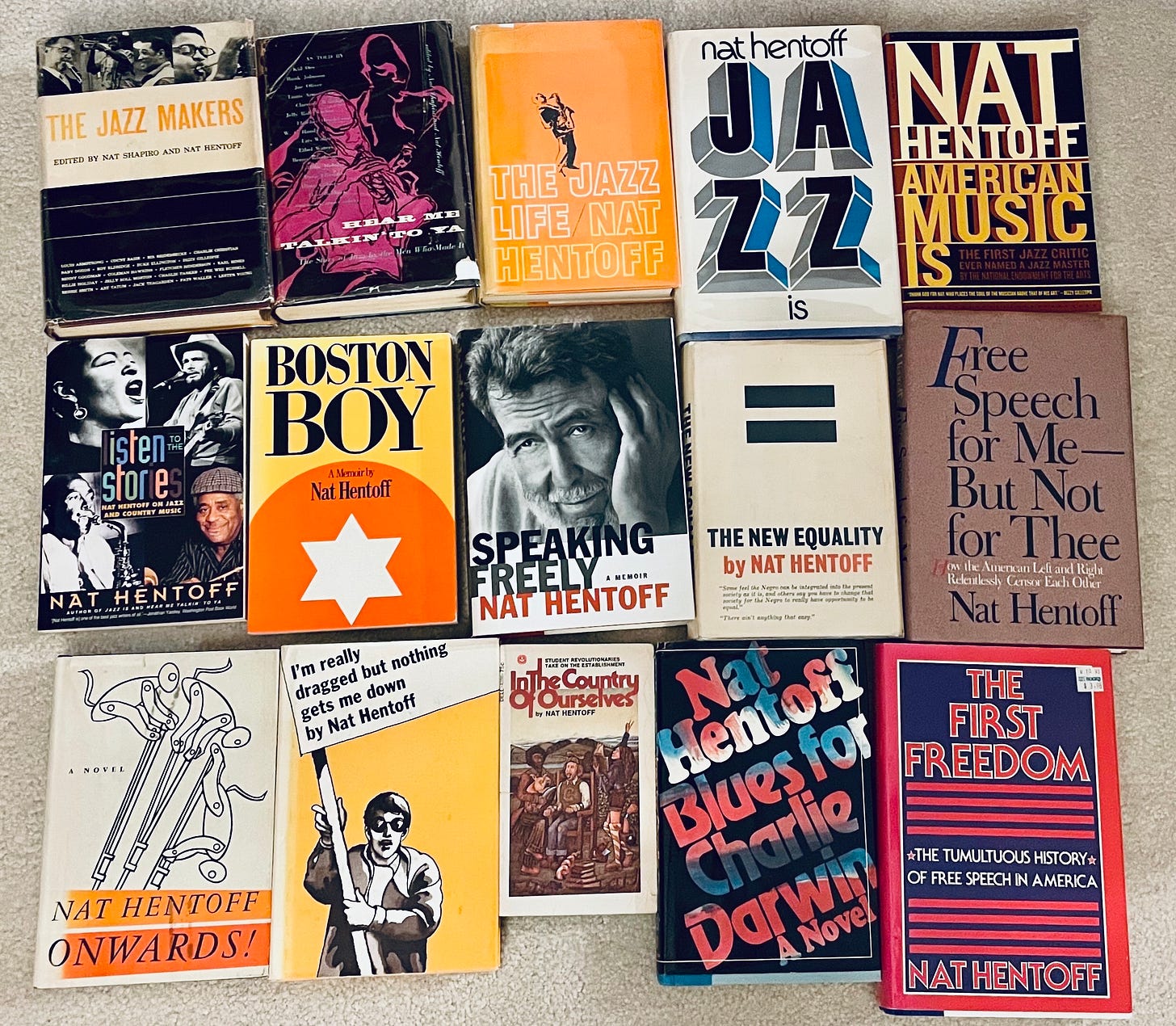The late Nat Hentoff would have turned 100 on June 10. Although some might argue that the main part of Hentoff’s legacy is political—as a champion of the First Amendment and author of countless pointed columns at the Village Voice and other places—he also did a tremendous amount for jazz, especially when he was young. Reading early Hentoff clarifies just how mainstream jazz was at midcentury. While this was a hit music that swept America, not every listener understood the price paid by its major practitioners. As a jazz critic, Hentoff strove to honor his gods and goddesses. A perfect example is one of the best jazz TV shows of all time (put together by Hentoff, Whitney Balliett and others), The Sound of Jazz from 1957, where Billie Holiday, Lester Young, and Coleman Hawkins and many others are all are captured in prime form.
But Hentoff was also a poet of the esoteric modern movement. He wasn’t a musician, but he understood the progression, and wrote important early appreciations of key avant-gardists. As a magazine editor he helmed a few wonderful years of the Jazz Review; he even produced classic Charles Mingus, Max Roach, and Cecil Taylor records for his record label, Candid.
The Hentoff book I know best is Jazz Is from 1976, where philosophical and metaphorical essays about various legends act in counterpoint with powerful quotes from the community and evocative black and white photos by Bob Parent.
There’s no good reason to be in this profession unless you have an essentially romantic relationship to the heroes of the music. Jazz Is was my gateway drug and a fabulous introduction to the mythos.
Hentoff could write prose well, but he also strove to include the voices of the musicians. The chapter on Charlie Parker in Jazz Is (“The Great Speckled Bird”) is introduced by two pages of provocative commentary from Cootie Williams, Miles Davis, Dizzy Gillespie, John Lewis, and Ralph Ellison.
His jazz critic peers rarely addressed the topic of race, but Hentoff tries to get in there, for example in this chapter on Charlie Parker, which ends up partly a meditation on how being black must have interacted with Bird’s self-destructive behavior. It’s all pretty strong stuff even today, let alone in 1976.
Inevitably, Jazz Is has some dated passages, and as much as I love how Hentoff quotes his heroes, at times there are just too many quotes within a chapter. (Not the only time this happens in Hentoff.) However, his essential reverent relationship with the music is absolutely correct, and the technical and aesthetic judgements about his favorite musicians are essentially correct as well.
Jazz history would be immensely poorer without Nat Hentoff’s passionate contribution.






His many books, liner notes and writings about jazz inspired me to do what I do.
Before ‘I got into the record business’ way back in the early 1970s I worked for the legendary Strand Bookstore.
The krew when I was there was quite amazing:
Writers, actors, authors, musicians, bibliomaniacs….
Craig Anderson, the son of Maxwell Anderson, Dick Komar Jr the son of Dorthory Killgallen and the actor Richard Komar, Tommy Miller aka Tommy Verlaine who founded the band Television to name a few.
Patti Smith was there too, just as I was departing. Her sister worked there too and married the Strand shipping clerk.
One of my Strand jobs was to go around to all the critics and magazines and pick up review books and galley's. Life magazine was one of my stops. I’d hit maybe 10 or more different departments from their Sixth Ave headquarters. My last stop was Loudon S. Wainwright, Loudon Wainwright III's father. He was the editor for the popular ‘Miscellany’ feature that always closed every issue of Life Magazine. His office walls were covered with the original photographs they used. He always gave me a ‘tip’ of free records and books.
I also picked up from Nat Hentoff.
I’d go to his West 12th St apartment through the service entrance.
I could hear him banging away on his manual typewriter.
He had books and records piled up outside his service entry door…tons of stuff.
After I announced myself he told me to take everything on the left and help myself to whatever records I wanted on the right as a tip.
Thank you Nat.
Thank you for this lovely piece! I will share it with my family.